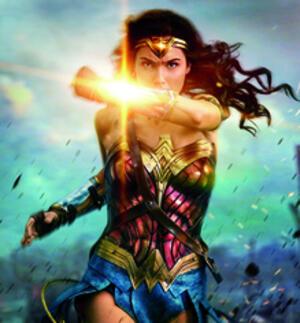The Wonder of Representation
I’d never cried watching a superhero movie before. I’d certainly never cried watching a superhero movie when no one was dying and when the protagonist was actually winning. When the good guy beats the bad guy, you’re definitely not supposed to tear up and start sniffling in the dark of the movie theater. But there I was: staring up at the big flashing screen, clutching popcorn, witnessing victory, and ... crying.
As someone who’s spent years watching almost every movie Marvel’s released, I’ve gotten used to the typical arc of a Captain America or an Iron Man film. The tension of the dramatic fights, the confusion over who’s paying for all those cars blowing up, and the relief of the inevitable triumph of the sometimes sarcastic, usually white, always ripped male hero constituted a familiar journey. These films were fun, they were easy, and it didn’t hurt that everyone in them was almost comically gorgeous.
However, I never felt—and never expected to feel—empowered.
Inspired, maybe, but never empowered. I never finished an Avengers film feeling like I could do everything the people on the screen did, because why would I? I was watching strangers. Those heroes weren’t me. I never believed I could do anything the Hulk could do.
And I did know that there was a problem with that. As an intersectional feminist, I’d spent years proudly advocating for increased representation in media for historically underrepresented groups. “Put more marginalized identities on screen!” I’d yell into any megaphone I could find. “Stop casting white dudes as characters that were actually transgender women of color!” “Normalize healthy, happy LGBTQ relationships!”
And these were, certainly, good causes to champion. It is of the utmost importance to cast people of all walks of life throughout Hollywood—no one wants another #OscarsSoWhite (or #SoStraight or #SoMale or #SoAblebodied or #SoAny of the overdone stories the film industry loves to tell)—and there wasn’t anything wrong with my support of that cause.
The issue lay in the fact that I didn’t really get it.
Mentally, I understood why representation was important. Emotionally, though, I hadn’t had the experience of seeing myself in a role I’d never before dreamed of seeing myself in. I didn’t know how transformative it could be to watch yourself become someone you always thought of as an unattainable ideal reserved for other people.
Not, that is, until Wonder Woman.
Watching Patty Jenkins’s 2017 film Wonder Woman was nothing short of a transformative experience. It was a victory, glorious and all-consuming, and it was my victory. I was the hero. And as I sat in that theater, tongue dry with over-buttered popcorn and stale air, I cried.
I was crying because I finally felt seen.
I cried because I’d never seen a woman on a screen like that, in a role that felt so in-your-face powerful, in a role that I’d only seen men play. Don’t get me wrong, I’d watched movies about powerful women before and loved them all, but the fictional world of superheroes and supervillains was still very much a boys’ club. In my mind, whether I liked it or not, my idea of a superhero was just that: A hero. Male. Never a heroine. Never a woman. Never me.
Watching Gal Gadot kick every single ass that stood in her way, hair waving and eyes sparkling, I saw myself on that screen for the very first time in my life. When I walked out of Wonder Woman, blinking into the sunlight and drying my eyes, I felt what the Hulk had never been able to give me. I felt empowered. And I finally understood what I’d been missing.
Representation isn’t just about reflecting the racial or gender breakdown of our population, it’s about telling stories that let people imagine themselves as something greater. It’s about giving people a glance into a future they didn’t know they were allowed to have. When we put marginalized identities in the spotlight and not only straight, white, cisgender males, people get to see themselves as powerful, as brave, as valid.
As superheroes.
And if that doesn’t bring tears to your eyes, I’m not sure what will.
This piece was written as part of JWA’s Rising Voices Fellowship.








Awesome!!
Yes! Name twin, you INSPIRE ME!